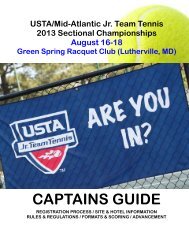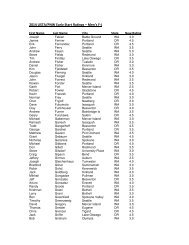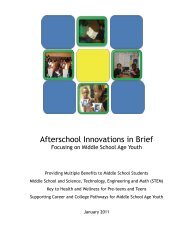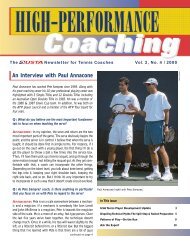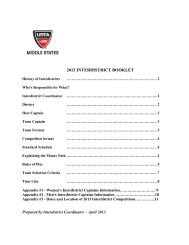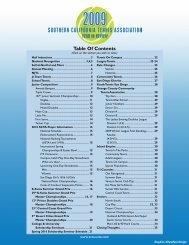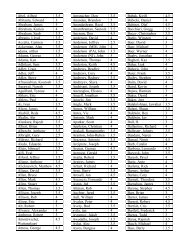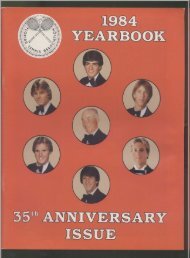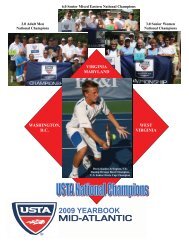FRIEND AT COURT 2010 - USTA.com
FRIEND AT COURT 2010 - USTA.com
FRIEND AT COURT 2010 - USTA.com
You also want an ePaper? Increase the reach of your titles
YUMPU automatically turns print PDFs into web optimized ePapers that Google loves.
30. Delays during service. When the Server’s second service motion is<br />
interrupted by a ball <strong>com</strong>ing onto the court, the Server is entitled to two serves.<br />
When there is a delay between the first and second serves:<br />
• The Server gets one serve if the Server was the cause of the delay;<br />
• The Server gets two serves if the delay was caused by the Receiver<br />
or if there was outside interference.<br />
The time it takes to clear a ball that <strong>com</strong>es onto the court between the first and<br />
second serves is not considered sufficient time to warrant the Server receiving two<br />
serves unless this time is so prolonged as to constitute an interruption. The<br />
Receiver is the judge of whether the delay is sufficiently prolonged to justify giving<br />
the Server two serves.<br />
SCORING<br />
31. Server announces score. The Server shall announce the game score before<br />
the first point of the game and the point score before each subsequent point of the<br />
game.<br />
32. Disputes. Disputes over the score shall be resolved by using one of the<br />
following methods, which are listed in the order of preference:<br />
• Count all points and games agreed upon by the players and replay only<br />
the disputed points or games;<br />
• Play from a score mutually agreeable to all players;<br />
• Spin a racket or toss a coin.<br />
HINDRANCE ISSUES<br />
33. Talking during a point. A player shall not talk while the ball is moving toward<br />
the opponent’s side of the court. If the player’s talking interferes with an opponent’s<br />
ability to play the ball, the player loses the point. Consider the situation where a<br />
player hits a weak lob and loudly yells at his or her partner to get back. If the shout<br />
is loud enough to distract an opponent, then the opponent may claim the point<br />
based on a deliberate hindrance. If the opponent chooses to hit the lob and misses<br />
it, the opponent loses the point because the opponent did not make a timely claim<br />
of hindrance.<br />
34. Body movement. A player may feint with the body while the ball is in play.<br />
A player may change position at any time, including while the Server is tossing the<br />
ball. Any other movement or any sound that is made solely to distract an opponent,<br />
including, but not limited to, waving the arms or racket or stamping the feet, is not<br />
allowed.<br />
35. Lets due to hindrance. A let is not automatically granted because of<br />
hindrance. A let is authorized only if the player could have made the shot had the<br />
player not been hindered. A let is also not authorized for a hindrance caused by<br />
something within a player’s control. For example, a request for a let because the<br />
player tripped over the player’s own hat should be denied.<br />
36. Grunting. A player should avoid grunting and making other loud noises.<br />
Grunting and other loud noises may bother not only opponents but also players on<br />
adjacent courts. In an extreme case, an opponent or a player on an adjacent court<br />
may seek the assistance of the Referee or a Roving Umpire. The Referee or official<br />
may treat grunting and the making of loud noises as a hindrance. Depending upon<br />
the circumstance, this could result in a let or loss of point.<br />
37. Injury caused by a player. When a player accidentally injures an opponent,<br />
THE CODE 49


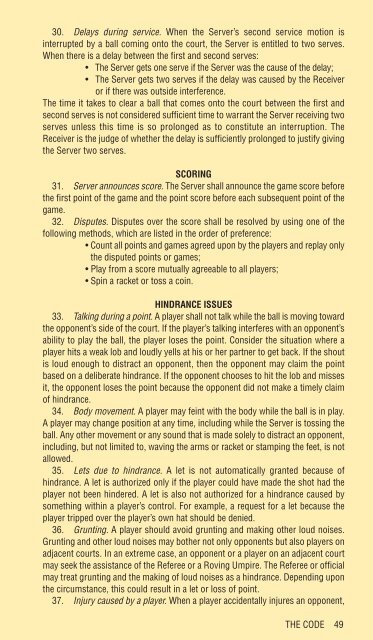
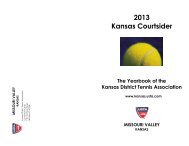
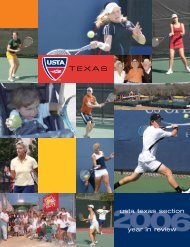
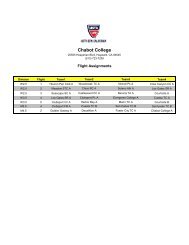

![COMPLETE - 2013 Tournament Schedule [11_20_12] - USTA.com](https://img.yumpu.com/21906454/1/190x245/complete-2013-tournament-schedule-11-20-12-ustacom.jpg?quality=85)

